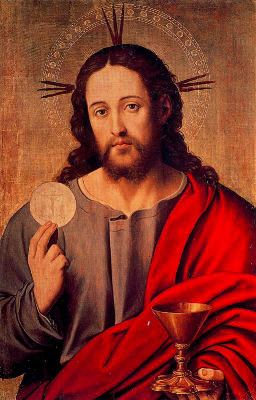 Readings:
Readings:
Genesis 14:18–20
Psalm 110:1–4
1 Corinthians 11:23–26
Luke 9:11–17
At the dawn of salvation history, God revealed our future in figures. That’s what’s going on in today’s First Reading: a priest-king comes from Jerusalem (see Psalm 76:3), offering bread and wine to celebrate the victory of God’s beloved servant, Abram, over his foes.
By his offering, Melchizedek bestows God’s blessings on Abram. He is showing us, too, how one day we will receive God’s blessings and in turn “bless God”—how we will give thanks to Him for delivering us from our enemies, sin and death.
As Paul recalls in today’s Epistle, Jesus transformed the sign of bread and wine, making it a sign of His body and blood, through which God bestows upon us the blessings of His “new covenant.”
Jesus is “the priest forever according to the order of Melchizedek,” that God, in today’s Psalm, swears will rule from Zion, the new Jerusalem (see Hebrews 6:20–7:3).
By the miracle of loaves and fishes, Jesus in today’s Gospel, again prefigures the blessings of the Eucharist.
Notice that He takes the bread, blesses it, breaks it, and gives it to the Twelve. You find the precise order and words in the Last Supper (see Luke 22:19) and in His celebration of the Eucharist on the first Easter night (see Luke 24:30).
The Eucharist fulfills the offering of Melchizedek. It is the daily miracle of the heavenly high priesthood of Jesus.
It is a priesthood He conferred upon the Apostles in ordering them to feed the crowd, in filling exactly twelve baskets with leftover bread—in commanding them on the night He was handed over:
“Do this in remembrance of Me.”
Through His priests He still feeds us in “the deserted place” of our earthly exile.
And by this sign He pledges to us a glory yet to come. For as often as we share in His body and blood. we proclaim His victory over death, until He comes again to make His victory our own.